If your dog’s poop looks a little soft but they’re still eating, playing, and acting totally fine — don’t panic! You’re definitely not alone. Many pet parents often ask, “Why does my dog have soft stools but is acting normal?”
In most cases, soft stools are not a sign of a serious health problem. It’s your dog’s digestive system saying, “Hey, something changed — and I’m adjusting!”
This vet-approved guide will help you understand:
✅ Why dogs sometimes have soft stools but feel fine
✅ Natural ways to firm up your dog’s poop
✅ When to call your vet
Let’s dive in and decode your pup’s poop like a pro. 💩

Is It Normal for Dogs to Have Soft Stools Sometimes?
Yes — it’s completely normal for dogs to have soft stools occasionally, especially when everything else seems fine.
If you’ve ever wondered, “Why does my dog have soft stools but is acting normal,” the answer usually lies in minor, temporary digestive changes rather than any serious illness.
A dog’s digestive system can be sensitive to small fluctuations — things like a sudden change in diet, a different water source, new treats, or even excitement and stress can cause the stool to become softer than usual. Sometimes soft stools point toward mild food intolerance in dogs, which we explain in our detailed guide.
As long as your furry friend is:
- Eating and drinking normally 🍗💧
- Remaining playful, alert, and active 🐾
- Showing no signs of pain, vomiting, or lethargy
…then an occasional soft stool is nothing to worry about. It’s just your dog’s gut saying, “Something’s a little different, but I’m adjusting.”
In some cases, loose or soft stool may continue for longer periods, especially when digestive sensitivity or diet-related issues are involved. If soft stools become frequent or ongoing rather than occasional, dietary support may play a larger role in long-term gut balance. Our detailed guide on Best Dog Foods for Chronic Diarrhea explains how nutrition can support dogs dealing with recurring digestive issues.
💡 Pro Tip: Keep a simple “poop diary” to monitor your dog’s stool consistency. Healthy dog poop should hold its shape, be firm yet slightly moist, and not leave sticky residue when picked up. Tracking this helps you notice patterns — and catch potential digestive issues early.
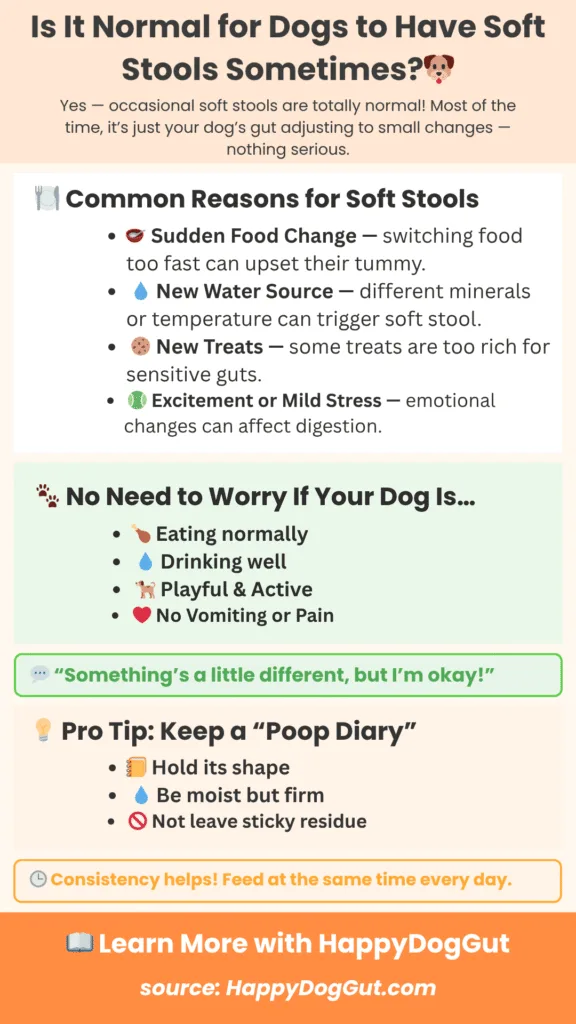
Common Reasons Why Dogs Have Soft Stools but Act Normal
If you’ve been wondering why your dog has soft stools but is acting normal, don’t panic — it’s usually a minor digestive issue. In most cases, your pup’s gut just needs a little time or dietary balance to get back on track.
Here are some of the most common, harmless reasons behind soft or mushy dog poop 👇
1. Sudden Food Change or Transition
One of the top reasons why dogs develop soft stools but still act normally is a sudden switch in their food.
Even the healthiest, high-quality dog food can cause temporary digestive upset if your pup’s gut bacteria haven’t had time to adjust.
When changing your dog’s diet, always make the switch gradually over 9–11 days. Rapid food changes often shock the digestive system, leading to loose stools or mild gas.
👉 For a step-by-step transition plan, check out our Dog Food Transition Guide: How to Switch Without Stomach Upset, which explains the vet-approved 11-day method to help your dog adjust smoothly.
2. Too Many Treats or Table Scraps
Another common cause of soft stools in dogs who seem fine otherwise is overindulging in treats or human food.
Even a few bites of greasy, spicy, or high-fat leftovers can loosen your dog’s stools.
Dogs love variety, but their digestive systems thrive on routine and consistency. Feeding too many treats or table scraps confuses the gut and disrupts the balance of beneficial bacteria.
Stick to dog-friendly snacks and avoid rich human foods. A consistent, nutrient-balanced diet helps keep stools firm and digestion stable.
3. Mild Gut Imbalance (Microbiome Issue)
If your dog has soft poop but is otherwise active and healthy, their gut microbiome may just be slightly off balance.
Factors like antibiotics, stress, or dietary changes can temporarily reduce healthy gut bacteria, resulting in mushy stools without any other symptoms.
Adding dog probiotics can restore this balance and firm up stools naturally.
4. Food Sensitivity or Intolerance
Some dogs are sensitive to certain ingredients — for instance, proteins like chicken or beef, or grains such as wheat or corn.
If you notice soft stools recurring regularly but your dog otherwise seems fine, this could point to a mild food intolerance.
Switching to a limited-ingredient or sensitive-stomach formula can help identify and eliminate trigger foods.
You can explore gentle, vet-approved diets in our Best Dog Food for Sensitive Stomachs (2025 Guide) — each option is formulated to reduce digestive discomfort and support optimal gut function.
5. Stress or Excitement
Believe it or not, stress and excitement can affect your dog’s stool consistency, too.
Events like traveling, moving homes, loud noises, or meeting new people or pets can briefly disrupt digestion, even if your dog seems perfectly happy otherwise.
Once your pup calms down, the stool usually returns to normal.
To minimize stress-related digestive changes, try maintaining a steady feeding and walking routine and providing a calm, predictable environment.
🐕🦺 Tip: Activities like gentle play, chew toys, and slow feeding bowls can help relieve anxiety and support a healthy gut.
6. Low-Fiber or Poor-Quality Diet
Fiber plays a major role in stool firmness and regular digestion.
If your dog’s diet is low in natural fiber or includes fillers, artificial preservatives, or poor protein sources, soft stools can occur frequently — even if your dog acts fine otherwise.
Look for high-quality dog foods that include natural fiber sources such as pumpkin, beet pulp, or oats. These ingredients improve stool texture and promote a balanced gut.
When soft stool is caused by low fiber, one of the simplest fixes is switching to a fiber-rich dog food designed specifically to firm stool and improve gut stability. Many dogs respond within a few days.
For more fiber-rich feeding tips, explore our post on Homemade Dog Food for Sensitive Stomachs, where we share easy recipes that keep digestion smooth and healthy.
✅ Key Takeaway:
If you’re asking, “Why does my dog have soft stools but is acting normal,” it’s usually linked to minor diet changes, gut imbalance, or stress — not disease.
Keep your dog’s diet consistent, support gut health with probiotics, and transition foods gradually to maintain a happy, healthy digestive system.
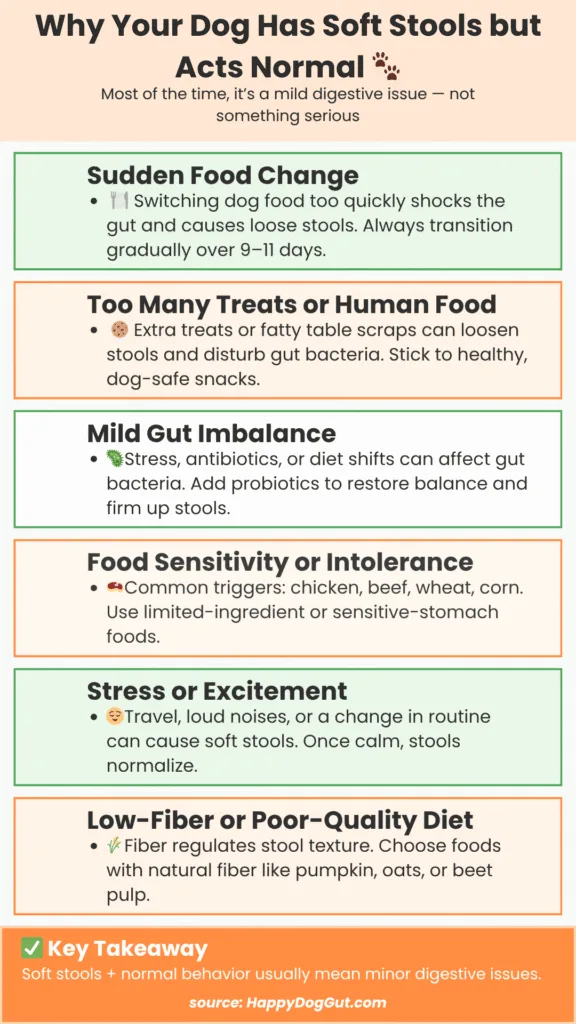
When to Worry About Your Dog’s Soft Stools
Even if your dog is acting normal, persistent soft stools can signal a mild digestive issue.
Watch for these warning signs that it’s time to call your vet:
🚨 See a vet if:
- Soft stools last more than 3 days
- Stool has blood or mucus
- The dog is lethargic or refusing food
- There’s vomiting or dehydration
If none of these apply, relax — your pup’s gut just needs a little help to rebalance.
If your dog’s soft stools continue for more than a few days or you notice other symptoms such as loss of appetite or lethargy, it’s best to consult your vet. For a detailed overview of possible causes and treatments, check out the American Kennel Club’s guide on dog diarrhea — it’s a trusted veterinary resource that explains when to seek professional help.
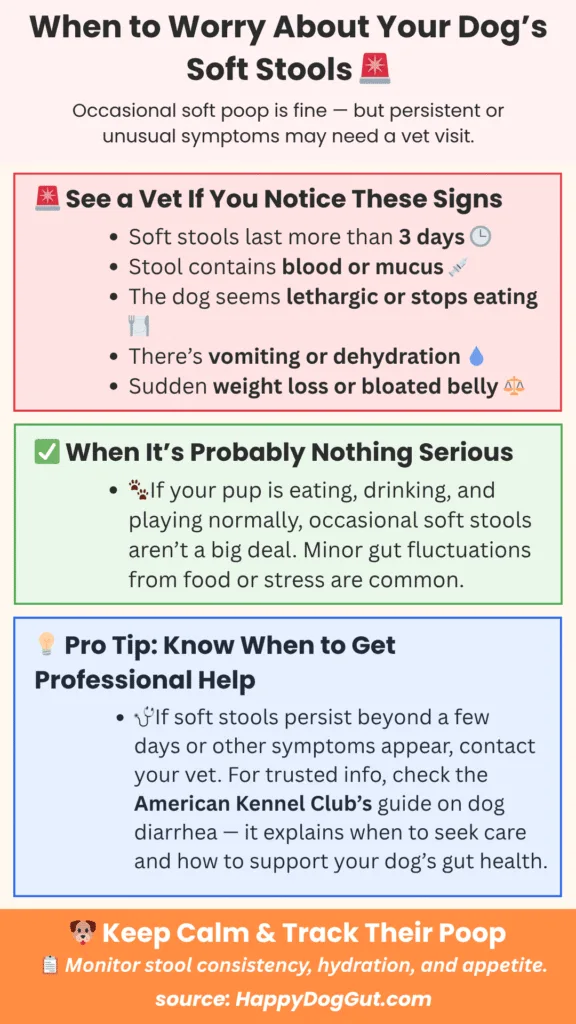
How to Firm Up a Dog’s Soft Stool Naturally
If you’re wondering why your dog has soft stools but is acting normal, the good news is — it’s often easy to fix at home.
Mild digestive upsets usually respond well to gentle, natural remedies that calm the gut and restore balance.
Here are some vet-approved ways to firm up your dog’s stool naturally 👇
1. Bland Diet: Boiled Chicken & White Rice 🍗🍚
A bland diet is one of the best first steps when your dog’s poop is soft but they seem fine otherwise.
Boiled, skinless chicken paired with plain white rice gives your pup easily digestible protein and carbohydrates, helping the digestive system rest and recover.
Feed small, frequent meals until the stool starts firming up.
Once things normalize, you can gradually transition back to regular food over a few days.
2. Add Plain Pumpkin 🎃
Plain pumpkin is a gentle, natural way to help your dog’s digestive system get back on track.
Its soluble fiber content absorbs excess moisture from loose stools and adds bulk for better consistency.
A spoonful or two (depending on your dog’s size) of unsweetened canned pumpkin or fresh cooked pumpkin can work wonders within a day or two.
💡 Want to know more? Check out our post Can I Give My Dog Pumpkin for Sensitive Stomach? to see exactly how much pumpkin to use and why it’s a digestive superfood.
3. Use Dog-Safe Probiotics 🦠
If you’ve ruled out diet changes and are still wondering why your dog’s stool is soft but they’re acting normally, the answer may lie in their gut bacteria.
A mild imbalance in the gut microbiome can cause soft stools even when your pup feels great otherwise.
Adding probiotics for dogs helps restore healthy bacteria, improves digestion, and reduces gas or bloating.
Vet-trusted products like Purina FortiFlora, Nutramax Proviable, or Zesty Paws Probiotic Bites are great daily options.
For detailed recommendations, visit our Best Probiotics for Dogs with Sensitive Stomachs (2025 Guide) — it breaks down which formulas work best for firm, healthy stools.
If soft stools continue to return, adding a gentle fiber supplement may help regulate bowel movements. Here’s our full guide to the best fiber supplements for dogs with sensitive stomachs.
4. Keep Your Dog Hydrated 💧
Hydration plays a huge role in stool texture.
If your dog isn’t drinking enough water, stools can become too soft or difficult to pass.
Always ensure your pup has access to fresh, clean water throughout the day.
If they’re reluctant to drink, try adding a splash of low-sodium chicken broth to their meals or offering wet food for added moisture.
💧 A well-hydrated dog digests better and bounces back faster from minor stomach upset.
5. Avoid Sudden Diet or Treat Changes 🚫
Even small changes can confuse your dog’s gut.
If you suddenly introduce new treats, switch food brands, or try multiple supplements at once, it can trigger temporary soft stools.
Keep things consistent — one food, one routine, and gradual transitions.
That steady approach gives your dog’s gut bacteria time to adapt naturally, preventing further upset.
👉 If you do need to change foods, follow our Dog Food Transition Guide: How to Switch Without Stomach Upset for the safest 11-day method recommended by vets.
If your dog frequently has soft or mushy stools but otherwise seems perfectly healthy and active, the problem may still be linked to nutrition. Many dogs develop loose stool when their diet doesn’t contain enough balanced fiber or easily digestible ingredients. In these cases, choosing the best dog foods for loose stool can make a noticeable difference in stool firmness and overall gut stability. These formulas are designed specifically to support dogs with mild digestive upset and can help normalize stool within a few days.
✅ Quick Recap:
If you’re asking yourself, “Why does my dog have soft stools but is acting normal,” try these natural remedies first: bland meals, pumpkin, probiotics, proper hydration, and consistency.
Most dogs respond within a few days, and their stool firms up without needing medication.
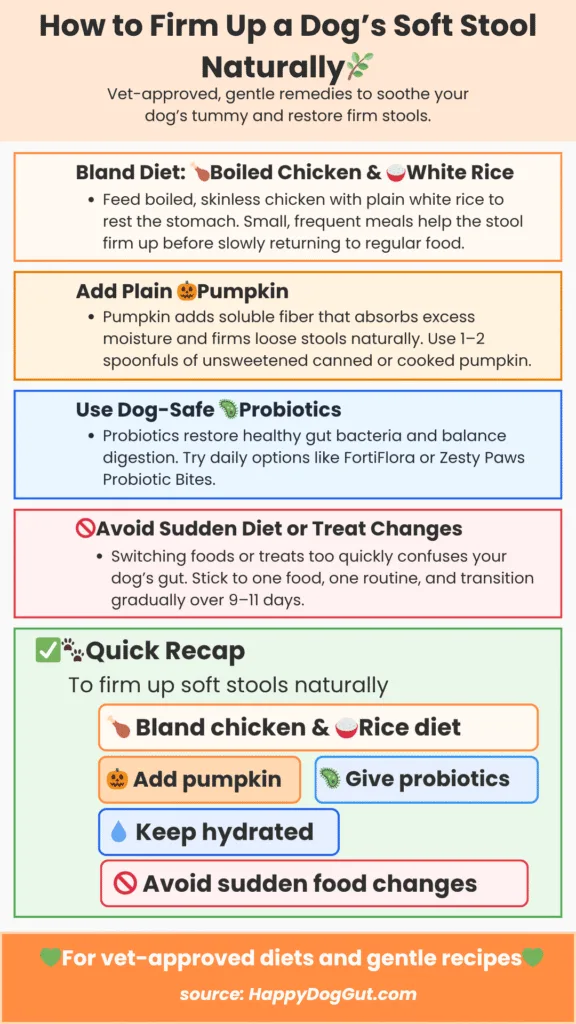
Vet-Approved Dog Diet Tips for Softer Stool
- Choose a sensitive stomach formula with prebiotics and digestible proteins.
- Transition foods gradually over 9–11 days.
- Maintain a regular feeding schedule.
- Include fiber-rich ingredients like pumpkin or oats.
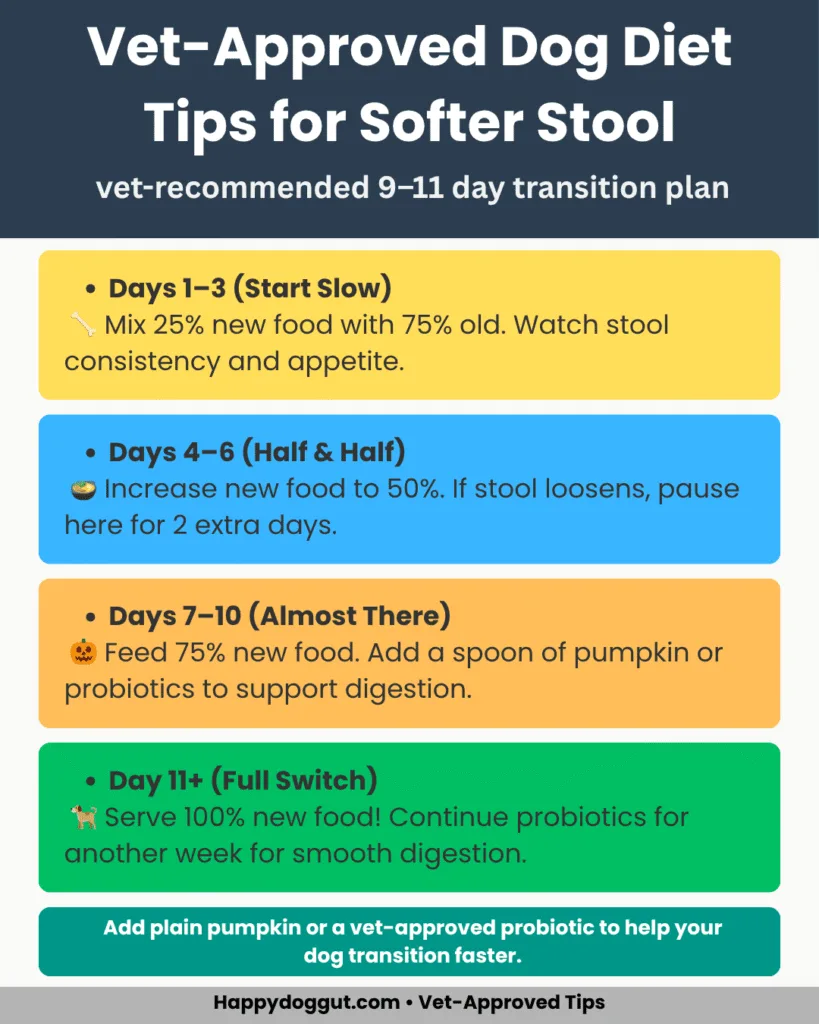
🔗 Read our Best Dry Dog Foods for Sensitive Stomachs in Small Breeds for top vet-recommended options.
When to See a Vet About Soft Stools
If soft stool persists after home care, it could be related to:
- Food intolerance
- Parasites
- Gut inflammation (IBD)
Don’t delay vet care if your dog shows lethargy, dehydration, or appetite loss. Early help prevents bigger issues.
How to Prevent Soft Stools in the Future
You can prevent tummy troubles by following these simple steps:
✅ Feed consistent, high-quality meals
✅ Avoid fatty human foods
✅ Add probiotics regularly
✅ Give plain pumpkin once or twice a week
✅ Keep exercise and hydration steady
🔗 Learn more natural tips in How to Calm a Dog’s Upset Stomach Naturally
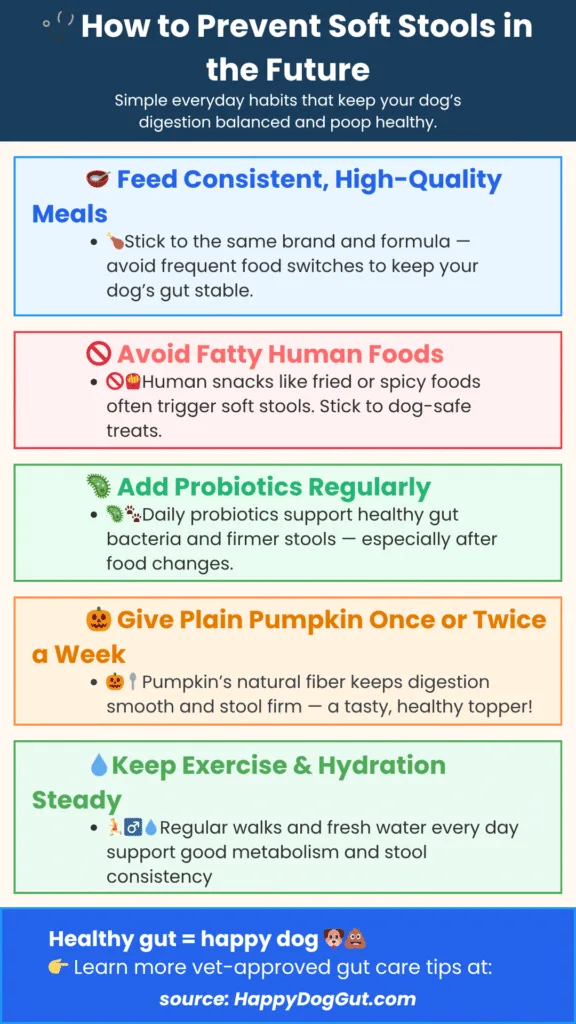
FAQs — Dog Has Soft Stool but Acting Normal
Q1. Why does my dog have soft stools but seem completely normal?
Soft stools with no other symptoms usually mean a mild digestive upset. This can happen from minor diet changes, stress, or too many treats. If your dog is eating, drinking, and active, it’s likely temporary and can be managed naturally with a bland diet or pumpkin.
Q2. How long should soft stools last before I worry?
If your dog’s stool stays soft for more than 3 days, or you notice mucus, blood, or lethargy, consult your vet. Occasional soft poop is normal, but persistent loose stools can indicate food intolerance or gut imbalance.
Q3. What should I feed my dog to firm up soft stools naturally?
Start with a bland diet of boiled chicken and white rice for 2–3 days. Add a spoon of plain pumpkin for fiber, and consider a probiotic supplement to restore gut balance. Always transition back to regular food slowly to avoid stomach upset.
Q4. Can overfeeding cause soft stools in dogs?
Yes — feeding too much at once can overwhelm your dog’s digestive system and lead to mushy stools. Stick to measured portions split into smaller meals throughout the day to help digestion and stool consistency.
Q5. Should I be worried if my dog’s poop is soft but not diarrhea?
Not necessarily. Soft but formed stool usually means mild irritation or diet sensitivity, not illness. Keep an eye on appetite, water intake, and energy levels — if all seem normal, your dog is likely fine.
Q6. Can probiotics help dogs with soft stools?
Absolutely. Probiotics are great for dogs with soft stools but normal behavior. They help balance gut bacteria, reduce gas, and firm up stool naturally. Look for vet-approved probiotic brands formulated for dogs with sensitive stomachs.
Q7. Why is my dog’s poop soft in the morning but firm later in the day?
This can happen due to overnight fasting, hydration levels, or morning stress. The first bowel movement may be softer, but later stools often normalize. Consistent feeding times and probiotics can help balance digestion throughout the day.
Q8. When should I take my dog to the vet for soft stools?
See a vet if your dog’s stool contains blood or mucus, lasts longer than 72 hours, or if your dog becomes lethargic, vomits, or refuses food. These may signal something more serious than a simple digestive upset.
Final Thoughts
A soft stool might look worrying — but if your dog’s tail is wagging, energy is up, and appetite is normal, it’s usually a minor gut issue.
Understanding why your dog has soft stools but is acting normal helps you take simple, natural steps to rebalance digestion.
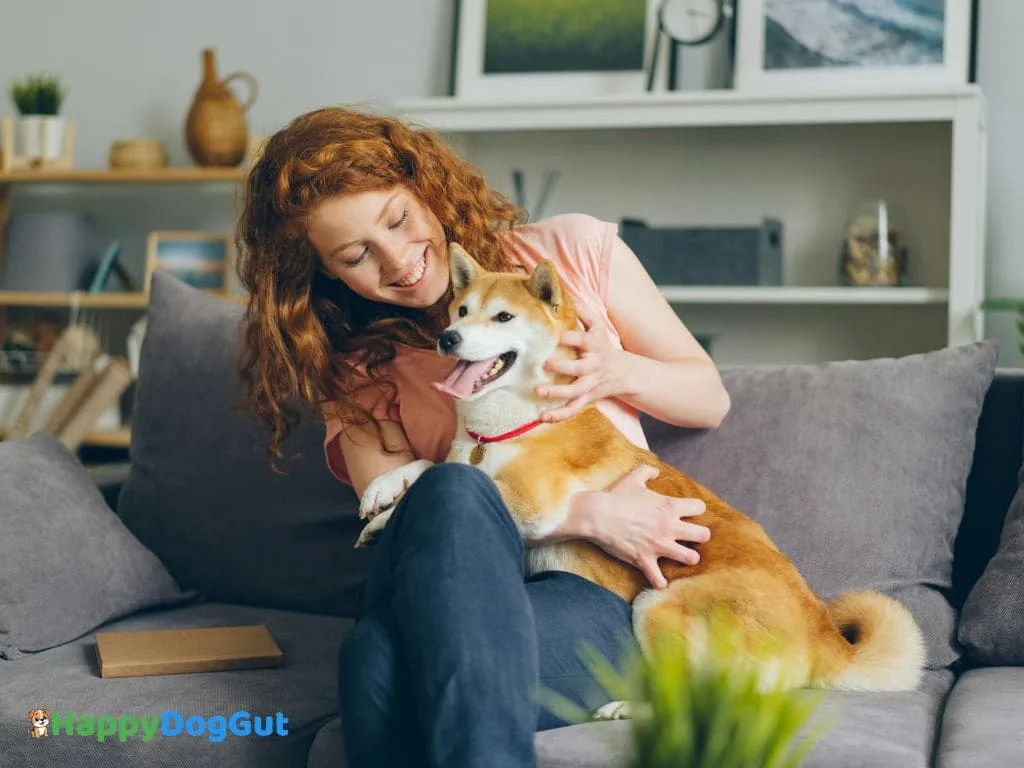
Stay consistent with food, add probiotics and fiber, and your pup will be back to firm, healthy poops in no time! 💩🐶
Key Takeaway: If soft stools persist, consider adjusting your dog’s diet with gentler meals — you can explore our Best Wet Dog Foods for Sensitive Stomachs (2025 Vet-Approved Guide) to find options designed for digestive comfort.
Hi, I’m Maddy, the writer behind HappyDogGut.com.
I’m passionate about helping Dog parents understand Gut Health, Sensitive Stomachs, and Natural Nutrition for dogs.
Every article I create is vet-approved, research-backed, and experience-driven, so your pup can enjoy a healthier, happier gut.
Happy Gut = Happy Dog!
All content on Happy Dog Gut follows our Editorial Policy.


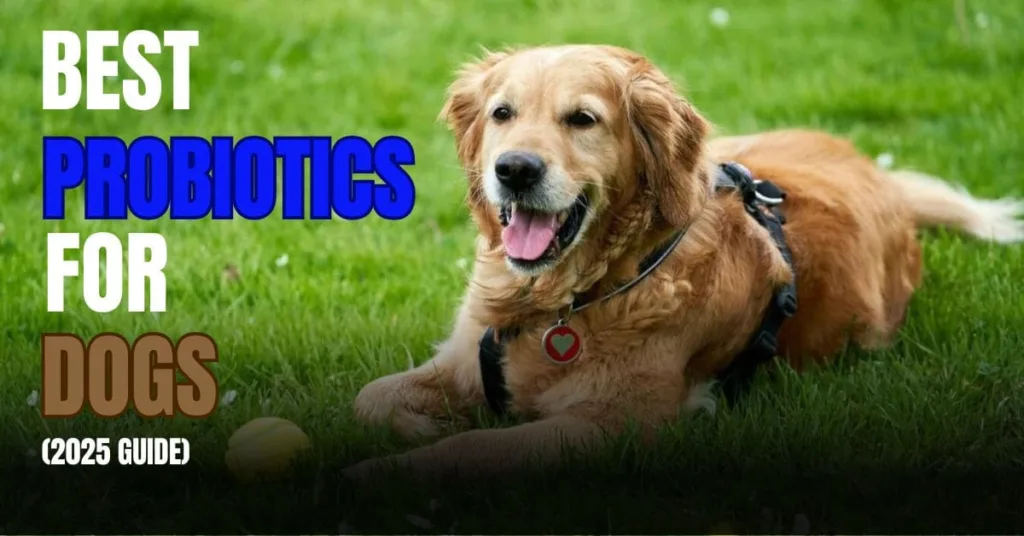
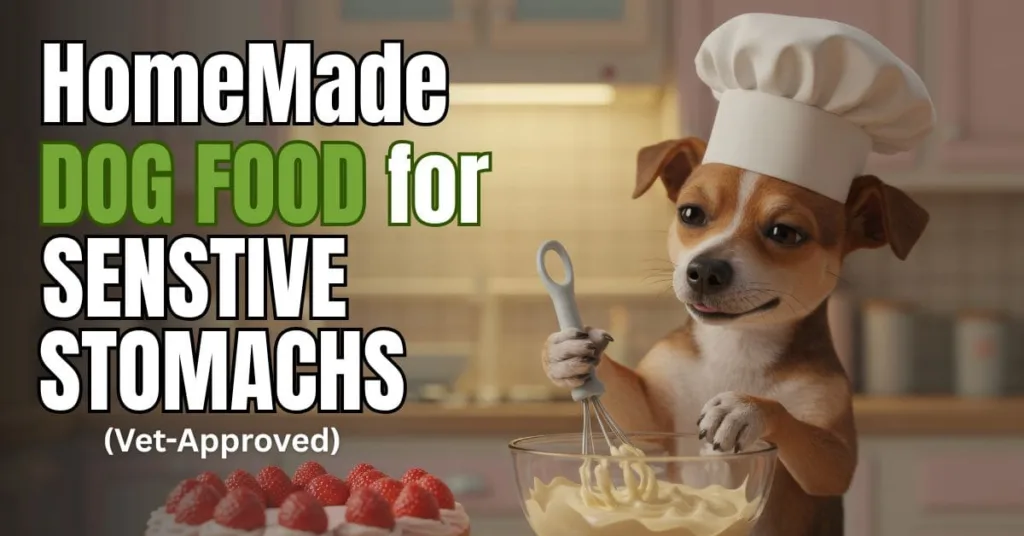
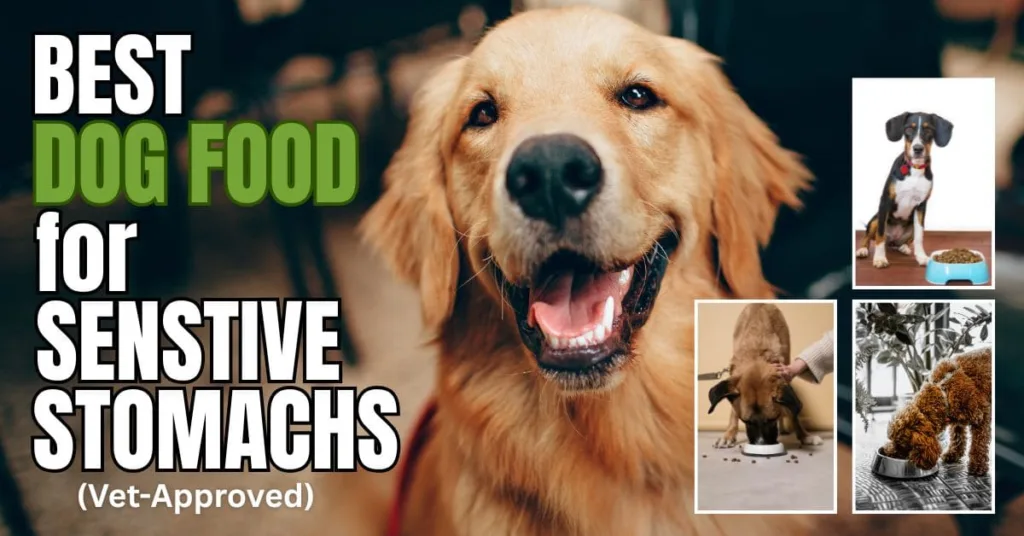
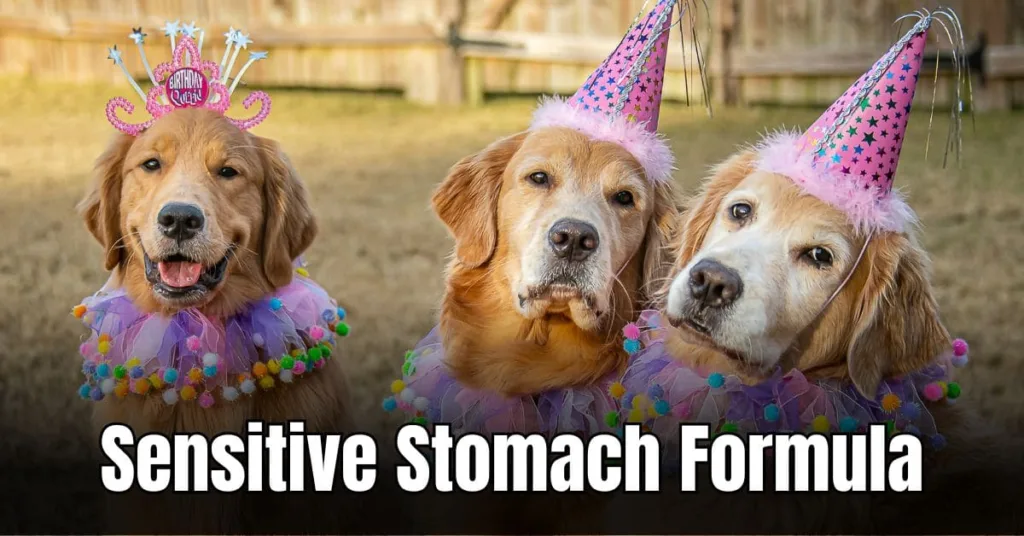
Pingback: How Long Does a Dog’s Upset Stomach Last? Timeline & When to Worry